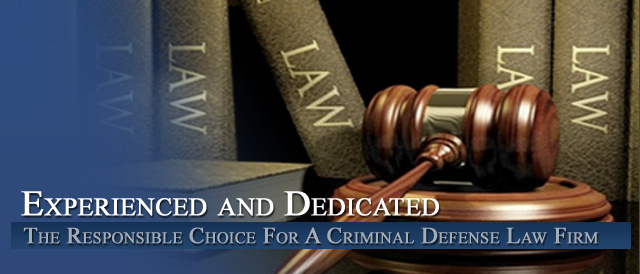




Common Defenses to Criminal Charges
Here are a handful of ways in which a defendant might assert a successful defense
Go To (Click Here) Mental States – What They Mean to Criminal Charges:
To convict a criminal defendant, the prosecutor must prove the defendant guilty beyond a reasonable doubt. As part of this process, the defendant is given an opportunity to present a defense. A defendant may mount a defense by remaining silent, not presenting any witnesses and arguing that the prosecutor failed to prove his or her case. Frequently, this is the best and strongest way to proceed. But there are many other types of defenses, from “I didn’t do it” to “I did it, but I was too drunk to know what I was doing.”
The Presumption of Innocence
All people accused of a crime are legally presumed to be innocent until they are convicted, either in a trial or as a result of pleading guilty. This presumption means not only that the prosecutor must convince the jury of the defendant’s guilt, but also that the defendant need not say or do anything in his own defense. If the prosecutor can’t convince the jury that the defendant is guilty, the defendant goes free.
The presumption of innocence, coupled with the fact that the prosecutor must prove the defendant’s guilt beyond a reasonable doubt, makes it difficult for the government to put people behind bars.
Proving Guilt “Beyond a Reasonable Doubt
The prosecutor must convince the judge or jury hearing the case that the defendant is guilty “beyond a reasonable doubt.” This standard is very hard to meet. (By contrast, in non-criminal cases, such as an accident or breach of contract, a plaintiff has to prove her case only by a preponderance of the evidence–anything over 50%.) As a practical matter, the high burden of proof in criminal cases means that judges and jurors are supposed to resolve all doubts about the meaning of the evidence in favor of the defendant. With such a high standard imposed on the prosecutor, a defendant’s most common defense is often to argue that there is reasonable doubt–that is, that the prosecutor hasn’t done a sufficient job of proving that the defendant is guilty.
Sometimes, however, a defendant can avoid punishment even if the prosecutor shows that that the defendant did, without a doubt, commit the act in question.
Self-Defense
Self-defense is a defense commonly asserted by omeone charged with a crime of violence, such as battery (striking someone), assault with a deadly weapon or murder. The defendant admits that she did in fact commit the crime, but claims that it was justified by the other person’s threatening actions. The core issues in most self-defense cases are:
- Who was the aggressor?
- Was the defendant’s belief that self-defense as necessary a reasonable one?
- If so, was the force used by the defendant also reasonable?
Self-defense is rooted in the belief that people should be allowed to protect themselves from physical harm. This means that a person does not have to wait until she is actually struck to act in self-defense. If a reasonable person in the same circumstances would think that she is about to be physically attacked, she has the right to strike first and prevent the attack. But she cannot use more force than is reasonable–if she does, she may be guilty of a crime.
The Insanity Defense
The insanity defense is based on the principle that punishment is justified only if the defendant is capable of controlling his or her behavior and understanding that what he or she has done is wrong. Because some people suffering from a mental disorder are not capable of knowing or choosing right from wrong, the insanity defense prevents them from being criminally punished.
Despite its ancient origins (England, 1505), the insanity defense remains controversial. Victim-oriented critics point out that a person killed by an insane person is just as dead as a person killed by someone who is sane, and argue that people should be punished for the harm they cause, regardless of their mental state. Critics also question the ability of psychiatrists, judges and jurors to determine whether a person genuinely suffers from a mental disorder, and to link mental disorders to the commission of crimes.
The insanity defense is an extremely complex topic; many scholarly works are devoted entirely to explaining its nuances. Here are some major points of interest:
-
Despite popular perceptions to the contrary, defendants rarely enter pleas of “not guilty by reason of insanity.” And when they do, judges and jurors rarely uphold it.
-
Various definitions of insanity are in use because neither the legal system nor psychiatrists can agree on a single meaning of insanity in the criminal law context. The most popular definition is the “McNaghten rule,” which defines insanity as “the inability to distinguish right from wrong.” Another common test is known as “irresistible impulse”: a person may know that an act is wrong, but because of mental illness he cannot control his actions (he’s described as acting out of an “irresistible impulse”).
-
Defendants found not guilty by reason of insanity are not automatically set free. They are usually confined to a mental institution until their sanity is established. These defendants can spend more time in a mental institution than they would have spent in prison had they been convicted.
-
An insanity defense normally rests on the testimony of a psychiatrist, who testifies for the defendant after examining him and his past history, and the facts of the case. Courts appoint psychiatrists at government expense to assist poor defendants who cannot afford to hire their own psychiatrists.
-
Once a defendant raises his or her sanity as a defense, he or she must submit to psychological tests. This can be a very painful and humiliating experience, one that many defendants choose to forego rather than rely on the insanity defense.
The Influence of Drugs or Alcohol
Defendants who commit crimes under the influence of drugs or alcohol sometimes argue that their mental functioning was so impaired that they cannot be held accountable for their actions. Generally, however, voluntary intoxication does not excuse criminal conduct. Defendants know (or should know) that alcohol and drugs affect mental functioning, and thus they should be held legally responsible if they commit crimes as a result of their voluntary use.
Some states allow an exception to this general rule. If the defendant is accused of committing a crime that requires specific intent” (intending the precise consequences, as well as intending to do the physical act that leads up to the consequences), the defendant can argue that he was too drunk or high to have formed that intent. This is only a partial defense, however, because it doesn’t entirely excuse the defendant’s actions. In this situation, the defendant will usually be convicted of another crime that doesn’t require proof of a specific intent. For example, a defendant may be prosecuted for the crime of assault with specific intent to kill but only convicted of assault with a deadly weapon, which doesn’t require specific intent.
The Alibi Defense
An alibi defense consists of evidence that a defendant was somewhere other than the scene of the crime at the time it was committed. For example, assume that Freddie is accused of committing a burglary on Elm Street at midnight on Friday, September 13. Freddie’s alibi defense might consist of testimony that at the time of the burglary, Freddie was watching Casablanca at the Maple Street Cinema.
Alibi is a perfectly respectable legal defense. Yet to some people the term connotes a phony defense. Defense attorneys usually are careful to remind jurors that alibi is simply a legal term referring to evidence that a defendant was elsewhere at the time a crime was committed, and that it in no way suggests falsity.
Entrapment
Entrapment occurs when the government induces a person to commit a crime and then tries to punish the person for committing it. However, if a judge or jury believes that a suspect was predisposed to commit the crime anyway, the suspect may be found guilty even if a government agent suggested the crime and helped the defendant to commit it. Entrapment defenses are therefore especially difficult for defendants with prior convictions for the same type of crime.
Other Articles of Interest:
- Tactics Defenses and Strategy
- Overview
- Exploring Defense to Criminal Charges
- Consent Defense In Colorado Sex Crimes Trials – What It All Means
- Criminal Defenses and Theories Of Defense In Colorado












